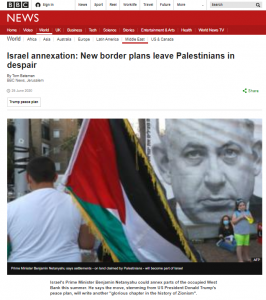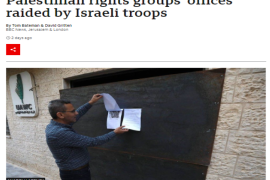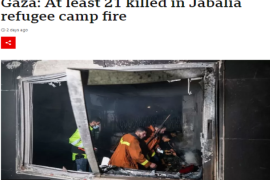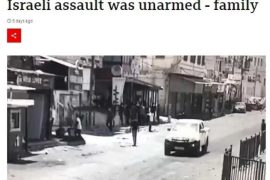The BBC’s generous coverage of an event which has not happened (see ‘related articles’ below) continued on June 25th with an article by the corporation’s Jerusalem correspondent Tom Bateman that appeared on the BBC News website’s ‘Middle East’ page under the headline “Israel annexation: New border plans leave Palestinians in despair”.
In previous BBC efforts to preemptively frame the story of the potential application of Israeli civilian law to communities in parts of Area C we saw that audiences were denied any information about the relevant history of the area before June 1967. The BBC has to date managed to completely avoid mentioning that what it partially, yet exclusively, terms ‘the West Bank’ had been assigned to the creation of a Jewish national home by the League of Nations over two decades before it was invaded, occupied and subsequently illegally annexed by the country known today as Jordan.
In Bateman’s latest long article the sole reference to part of that history comes in the form of a euphemistic and distinctly uninformative mention of “Jordanian control”.
“Most of the big settlement blocs are just across the Green Line, the armistice line from before the 1967 Arab-Israeli war, when Israel captured the West Bank from Jordanian control.”
By erasing the relevant history from its framing the BBC is able to continue to promote its standard partisan framing of Israeli communities in Judea & Samaria as “illegal”.
“The settlements are seen as illegal under international law, stemming from the prohibition on countries transferring part of their populations to areas under military occupation. Israel rejects this, arguing the territory is “disputed” rather than occupied.”
While opaquely invoking part of Article 49 of the Fourth Geneva Convention (but having failed to clarify that the territory concerned was previously under illegal Jordanian occupation), Bateman of course does not provide his readers with information which would enhance their understanding of why “Israel rejects this”.
The BBC’s repeated avoidance of the area’s history also enables it to employ the inaccurate term ‘annexation’.
“Israel’s Prime Minister Benjamin Netanyahu could annex parts of the occupied West Bank this summer.”
Bateman’s portrayal of more recent events likewise leaves much to be desired.
“Before a watchtower, concrete stumps alongside a dust road mark out a future line to extend Israel’s network of walls, fences and checkpoints – the separation barrier.
Its construction began during the second Palestinian intifada, or uprising, of 2000-2005, when suicide bombings frequently killed Israelis and Israel launched sweeping incursions into West Bank cities.”
Along with the fact that readers are not told who initiated, financed and carried out those suicide bombings, Bateman’s phrasing fails to clarify that those terror attacks were the reason for Israeli military operations in Palestinian cities eighteen months after the second Intifada began when almost 300 Israelis had already been murdered.
Bateman goes on to promote a baseless Palestinian claim concerning the anti-terrorist fence which has been repeatedly amplified by the BBC in the past.
“Israel says the barrier saves lives. Critics call it a device to grab land.”
Another predictable feature of Bateman’s article is the inclusion of a particularly large version of the much recycled partisan map sourced from the political NGO B’tselem which, among other things, portrays the Jewish Quarter of the Old City of Jerusalem as a ‘settlement’.
B’tselem is however not the only political NGO to provide material for Bateman’s article. The road trip on which it is based takes him to a meeting with the founder of the foreign funded NGO ‘Kerem Navot’.
The BBC’s editorial guidelines on impartiality state:
“4.3.12 We should not automatically assume that contributors from other organisations (such as academics, journalists, researchers and representatives of charities and think-tanks) are unbiased. Appropriate information about their affiliations, funding and particular viewpoints should be made available to the audience, when relevant to the context.” [emphasis added]
Bateman’s portrayal of Etkes and his organisation does not make any effort to comply with those stipulations.
“We stand a few metres from a section of the separation barrier – an 8m-high (26ft) concrete wall here that conceals from our view Palestinian homes on the other side, as cars bearing Israeli number plates zoom across the bridge above us.
This is the “whole story of the West Bank in the last 53 years”, according to Dror Etkes, who runs the Israeli non-governmental organisation Kerem Navot (Navot’s Vineyard – named after a Biblical figure murdered for his land), which monitors settlement construction.
“It’s about taking from the Palestinians and giving to the Israelis. The way you do it is confiscating land and allocating only to Israelis. That’s one. And the other is sealing up and preventing the expansion of Palestinian communities,” he says.”
The first of Bateman’s road trip stops is at an Arab village south of Bethlehem.
“Among grapevines and olive trees, Mohammed Yehya Ayer shows me his land.
We’re on a ridge outside the Palestinian village of Irtas [Artas – Ed.]. Some of the West Bank’s familiar colour codes are on display. Orange [terracotta – Ed.] rooftops curve across a hilltop to the south-west – the neat suburban layout of the Israeli settlement of Efrat.”
Readers of this article about an event yet to transpire find speculations about the possible outcome of something else which has yet to happen.
“Israel is planning a new settlement, called Givat Eitam, north-east of where I walk with Mohammed. It would be considered a neighbourhood of Efrat. Mohammed’s land is within an area sandwiched between the two [sic] settlements.
“If Efrat builds there by force, they might install gates and fences and not allow us to cross our lands,” he says. “They would tell us to get special permits and approvals.”
The Israeli authorities routinely point out that fence routes can be challenged in the planning process or the courts. They declined to comment on the specific claim about access if Givat Eitam goes ahead.
Judges are due to rule on an appeal against the land allocation for the settlement itself.” [emphasis added]
Bateman refrains from informing readers that Givat Eitam – which lies within the jurisdiction of the Efrat local council – includes land owned by the Jewish National Fund subsidiary Himanuta as well as state land. Contrary to Bateman’s claim that “judges are due to rule”, various Hebrew media outlets reported in early May that the ruling has already been given.
Bateman recycles the ‘apartheid’ smear already seen in a previous BBC report.
“The Palestinian leadership, along with almost 50 experts appointed by the United Nations Human Rights Council, say this would formalise a system of “apartheid” in the West Bank – two peoples ruled by one state in the same space with unequal rights.”
Bateman’s road trip includes a press conference in Ramallah and readers get an extensive view of the Palestinian Authority prime minister’s stance. In addition to the headline portraying “Palestinians in despair”, readers are told that “[t]he Palestinians are defiant” but with the exception of the farmer from Artas, readers hear nothing of the views of ordinary Palestinians which may or may not support Bateman’s descriptions.
Tom Bateman’s account of his road trip does not provide readers with any new insights into the topic that the BBC has been pushing for almost a month and a half. The fact that audiences have not been given an objective and accurate account of the history of the region where Israeli civilian law may or may not be applied in the future in all that time indicates that the BBC is far more interested in promoting a chosen political narrative than in meeting the requirements of its public purposes.
Related Articles:
BBC NEWS AND BBC RADIO 4 MISLEAD AUDIENCES WITH JULY 1 ‘ANNEXATION’ CLAIM
THE BBC CONTINUES TO FRAME AN EVENT WHICH HAS YET TO HAPPEN
THE BBC’S ONE-SIDED ‘ANNEXATION’ BINGE CONTINUES
BBC NEWS MISREPRESENTS ‘PREVIOUS US POSITIONS’
REVIEWING THE BBC’S ‘ANNEXATION’ BACKGROUNDER – PART ONE
REVIEWING THE BBC’S ‘ANNEXATION’ BACKGROUNDER – PART TWO
BBC NEWS AGAIN AMPLIFIES OPPOSITION TO APPLICATION OF ISRAELI CIVIL LAW
BBC JERUSALEM CORRESPONDENT AGAIN MISLEADS ON THE OSLO ACCORDS






If you are criticizing the BBC for selective history you should at least make an effort to avoid doing the same. In your selective history of the West Bank you omitted the fact that it was allotted to a Palestinian State by the 1947 UN Partition Plan.
The 1947 UN Partition Plan was a recommendation which was immediately rejected by the Arab states. It hence has no significance.
So you are allowed to decide what is “significant” and Mr. Bateman isn’t ?
The League of Nations decision that you mention was also a “recommendation” and I doubt whether it was enthusiastically embraced by the Arabs.